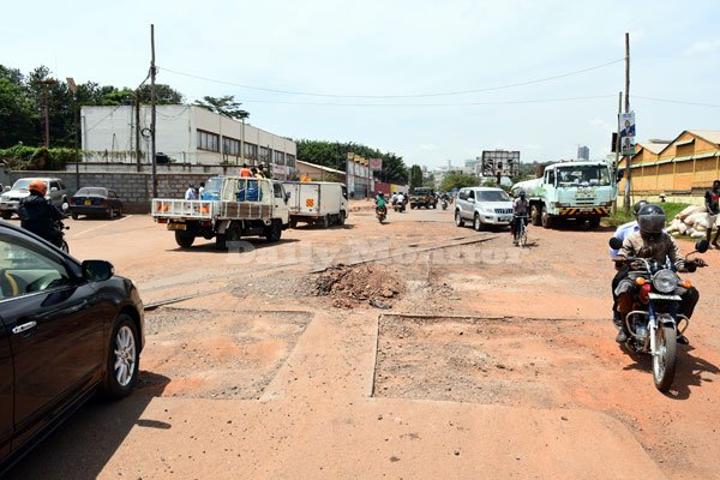Africa-Press – Uganda. Authorities at City Hall through a contractor have dug up and re-shaped about 220 potholes for resealing on roughly a kilometre-long section of 8th Street in Industrial Area.
The patchwork being executed by Ali Mubarak Consulting Ltd, an engineering company, follows a similar one nearly three months ago when some of the potholes were filled with compacted gravel.
In an on-spot audit, our reporter counted 223 potholes on Eighth Street, stretching from the Mukwano Road junction to the turn off onto Main Access Road (Ssali Stage), which connects to 7th Street.
The road section is barely a kilometre-long and links to, among other places, Namuwongo Market via Total Uganda head office, this newspaper’s headquarters and Shell fuel depots.
As such, it conveys heavy traffic load, and among heavy-duty trucks plying the route are fuel tankers.
The current roadworks began last week with the marking and reshaping of the potholes in front of Total Uganda headquarters.
By nightfall yesterday, a number of Ali Mubarak Consulting Ltd firm workers could be seen refilling and compacting gravel in the dug-out potholes and re-sealing them with cold patch materials.
The decay of Eight Street epitomises the more general crumbling of city roads that Kampala Capital City Authority (KCCA) officials blame on limited funding to enable regular maintenance or rebuilding of new ones.
“All Industrial Area roads and other roads in the city have outlived their life (span),” Mr Justus Akankwasa, the KCCA director of engineering and technical services, said yesterday while explaining the resort to patchwork.
It is a contrast to the era of former Executive Director, Ms Jennifer Musisi, whose better-funded tenure was marked by significant infrastructure upgrade in both the central business district and outskirts, giving the capital a new look and better aesthetics.
KCCA’s annual budget grossed Shs660 billion under Ms Musisi, but has since been slashed to an average Shs490 billion.
Some of the roads, including Makerere Hill Road, Binaisa Road, and Berkley (Bakuli)-Nakulabye-Kasubi stretch on Hoima Road, were at the time upgraded under the World Bank-funded Kampala Infrastructural and Institutional Development Project (KIIDP).
The upgrades included reconstructing and widening city roads, converting roads into dual carriage, signalizing junctions, designing and constructing drainage channels and updating a multi-modal urban transport master plan.
These physical developments displaced some people and businesses while the accompanying high-handed crackdown by KCCA Law Enforcements officers alienated low-income city-dwellers and stirred public displeasure.
Ms Musisi, who presently lives in the United States, resigned in October 2018 after President Museveni publicly said he lost in the city during the 2016 presidential election due to the former’s abrasive work methods.
In yesterday’s interview, engineering director Akankwasa said City Hall is in advanced stages of securing $250m (Shs900b) loan from the African Development Bank (ADB) to overhaul broken roads in Kampala.
“We have finished the designs and bills of quantities [of the planned roadworks], which we sent to the [ADB] for approval and as soon as we get them, we shall start the process,” Mr Akankwasa said.
The engineering director declined to disclose the contract value of the ongoing patchwork on Eighth Street, but said KCCA receives about Shs25 billion from the Uganda Road Fund annually for rehabilitation of roads.
Upgrading of one kilometre of road from gravel to bitumen can cost upwards of $1 million (Shs3.6b), according to Uganda National Roads Authority (Unra) estimates, subject to lanes, terrain and layering materials used.
A good number of roads in Kampala and other parts of Uganda end up being merely patched whenever they have to be worked upon. PHOTO/DAVID LUBOWA.
Some motorists and regular users of Eighth Street, however, argue that the regular temporary sealing is waste of money since the covered potholes will more likely be quickly weakened and reopen under the weigh of heavy traffic load.
“I advise KCCA to stop the habit of patching this road [but rather] upgrade it by putting a new layer. Otherwise, this practice of patching up the potholes every after three months doesn’t help at all and instead worsens the situation for us – motorists,” said Mr Chris Mugaga, a motorist.
Other road users have questioned the logic of opening up wide side-by-side potholes instead of removing the aged and broken layers altogether.
The vast potholes slow traffic, damage tyres and render the road prone to accidents as motorists swing from one side of the road to the other while dodging the ruts.
“The continuous patching of roads shows that KCCA is broke. They need to set their priorities and engage government as far as funding is concerned because the state of roads in the city is alarming,” Mr Isa Kimbugwe, a motorist said.
Other severely cracked roads include Makindye-Luwafu Road and Salama Road, both in Makindye, Mulwana Road, 7th and 5th Street, all in Industrial Area, and Kinawataka Road and Old Kira Road in Central and Nakawa division.
KCCA took over a road network of 1,200kms in 2011, but when a new road inventory was conducted in 2015, it was established that the city had a total road network of 2,110kms.
Mr Akankwasa said they have paved at least 620 kilometres of the city’s total road network, but the directorate of engineering requires more funding to overhaul the infrastructure.
To Ms Annet Nabwire, a city dweller, KCCA should remove aged surfaces and place new layers instead of repeatedly patching the sections because
“we are tired of it”. “They patch it every after three months and this inconveniences motorists,” she said.
Her concerns were echoed by Mr Patrick Oringi who urged KCCA to plan well and renovate the roads at once in order to save money. “The problem is that these patches are washed away whenever it rains,” he added.
If it secures the Shs900 billion loan from ADB, KCCA plans to tender out the infrastructure upgrade works under five separate contracts, with some of the works involving signalisation of junctions to ease traffic flow.
What motorists say
Motorists say the patches on the roads inconvenience them. PHOTO/DAVID LUBOWA.
Hassan Kimbugwe.
The continuous patching of roads shows that KCCA is broke. They need to set their priorities and engage government as far as funding is concerned because the state of roads in the city is alarming.
Annet Nabwire
They should upgrade them by putting a new layer instead of patching them up because we are tired of this. They patch it every after three months and this inconveniences motorists.
Patrick Oringi
KCCA should stop patching the holes and renovate this road at once because this will save money. The problem is that these patches are washed away whenever it [email protected]






